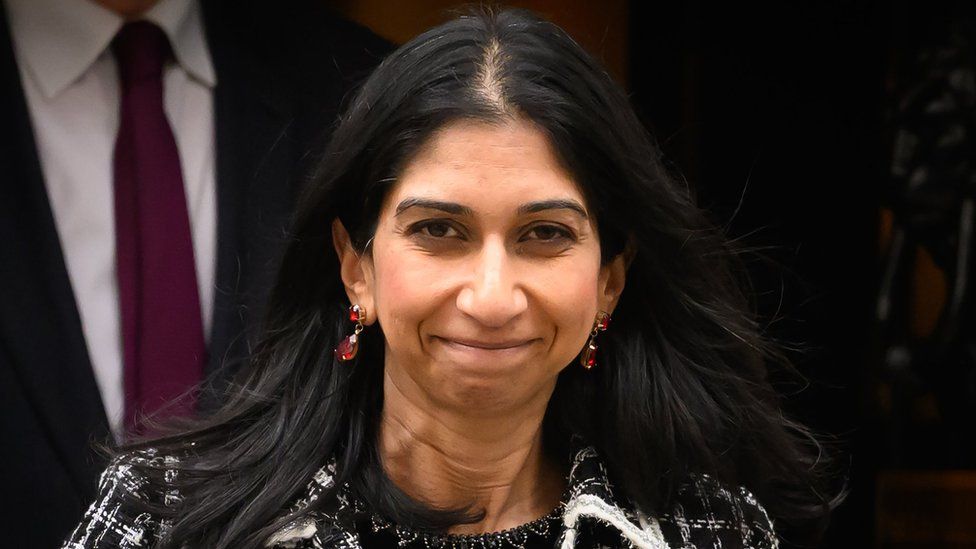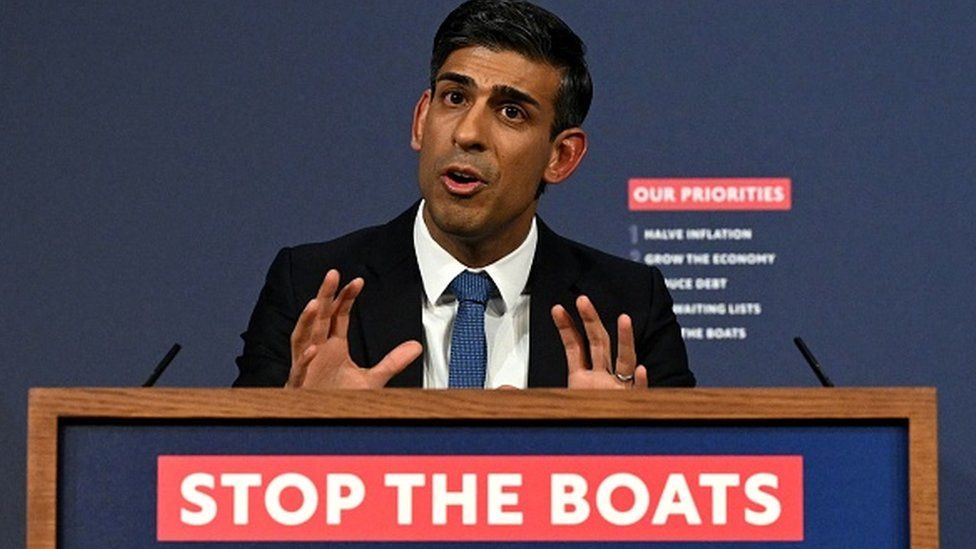Migration plans are compassionate, says Suella Braverman

Suella Braverman has insisted her migration plan is compassionate, after Britain’s rights watchdog said it put people at risk of serious harm.
The Equality and Human Rights Commission (EHRC) says the Illegal Migration Bill penalises refugees and could breach international law.
But the home secretary denied this, and said it would deter people from making dangerous Channel crossings.
It comes as the bill faces its final stages in the Commons later.
Ministers are still in last-ditch talks with Conservative rebels who want to limit how long unaccompanied children could be detained under the bill.
The government has already struck deal with a different set of Tory rebels over European court rulings, giving UK minsters more leeway to ignore them.
Ministers have also committed to consulting on new safe and legal routes for migrants, after pressure on the issue from backbenchers.
- UK migration bill set to be toughened
- Asylum plan risks breaching human rights – watchdog
- How is the UK stopping Channel crossings?
The bill, unveiled in March, is a key part of Prime Minister Rishi Sunak’s plan to “stop” small boats crossing the English Channel.
It will place a legal duty on the home secretary to detain and remove those arriving in the UK illegally, to Rwanda or a “safe” third country.
This will take legal precedence over someone’s right to claim asylum, prompting accusations it will put the UK in breach of its legal obligations towards refugees.
In a statement on Monday, the EHRC said it had concerns the bill risked a breach of international law, and “exposing individuals to serious harm”.
It also added that it had concerns over “broad provisions” in the bill to detain children and pregnant women arriving on small boats.
‘Element of deterrence’
But Ms Braverman rejected the watchdog’s criticism, saying she disagreed with the idea the bill would put people at serious harm.
Asked about the EHRC’s view on BBC Breakfast, she said: “I refute the suggestion our measures are unlawful, or indeed cruel or inhumane.
“Our measures in the bill are both robust and humanitarian and compassionate,” she added.
“We need to inject an element of deterrence, so that people don’t make the treacherous journey on a flimsy dinghy in the middle of the night in the first place”.
She declined to say how many extra places would be needed to detain people under the new bill, saying more capacity would be needed but she could not give a “precise figure”.
Sudan concerns
She also faced questions about whether the UK would create new legal routes for people fleeing violence in Sudan.
Asked why new routes for them have not yet been announced, she said the UK’s current priority was to support British nationals, and there were “a lot of unknowns” about how the situation would develop.
On Tuesday, Immigration Minister Robert Jenrick said the UK was supporting other countries hosting refugees in the region, but conceded that “in time” the crisis was likely to lead to new migration pressures.
The government has already committed to publishing a report on new safe and legal routes within six months of the bill becoming law, to be implemented by the end of 2024.
It means a rebellion on that issue is unlikely in the Commons later, although talks are ongoing over a different rebel amendment on child detention.
Under the amendment, tabled by Tory MP Tim Loughton, the Home Office would require approval from a court to detain unaccompanied child migrants for more than three days.
The bill is widely expected to face significant opposition when it proceeds to the House of Lords for further scrutiny.
Related Topics
- Suella Braverman
- Refugees and asylum seekers
- Migration
-
UK migration bill set to be toughened
-
6 days ago

-
Published at Wed, 26 Apr 2023 10:36:21 +0000
